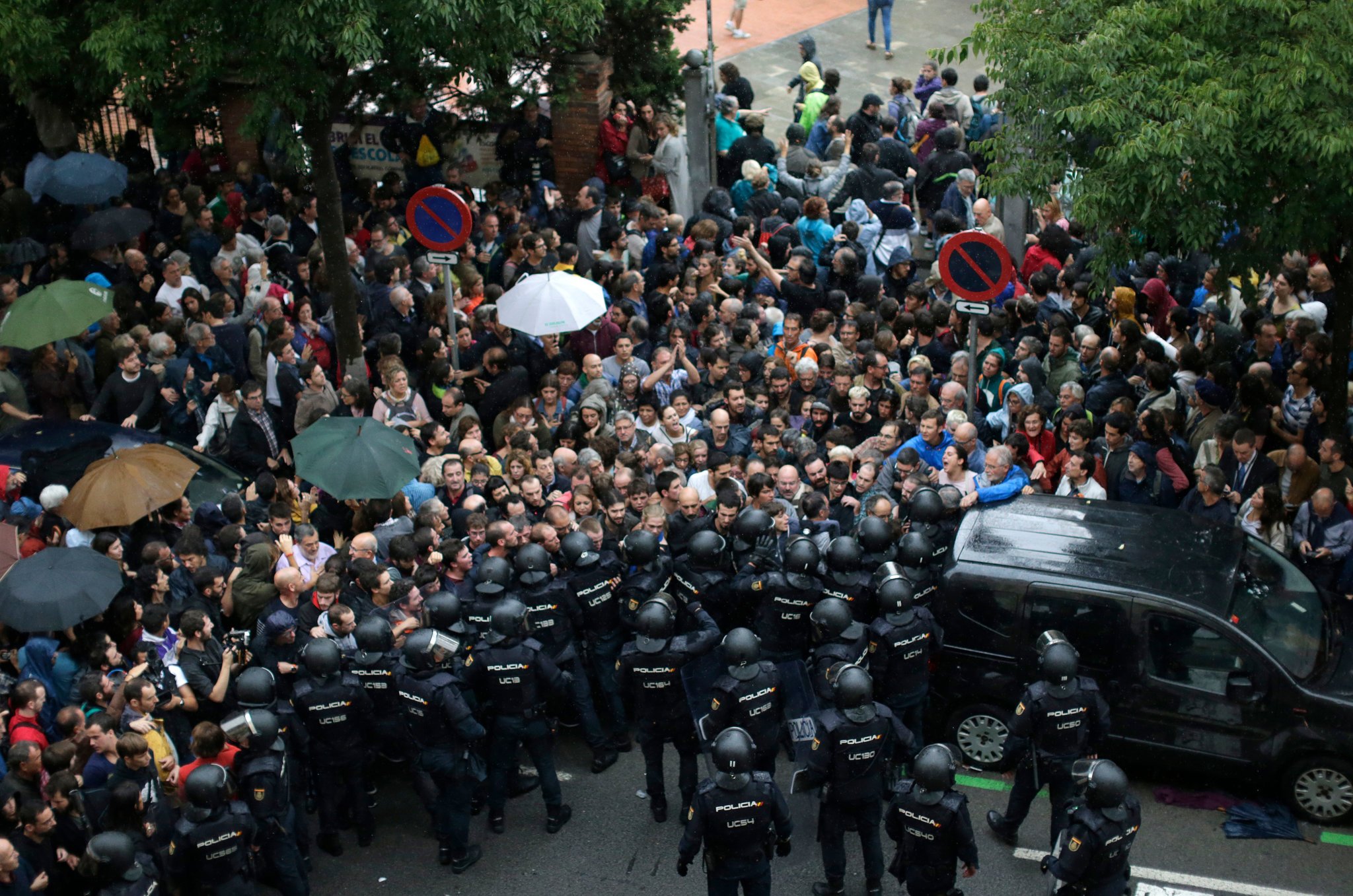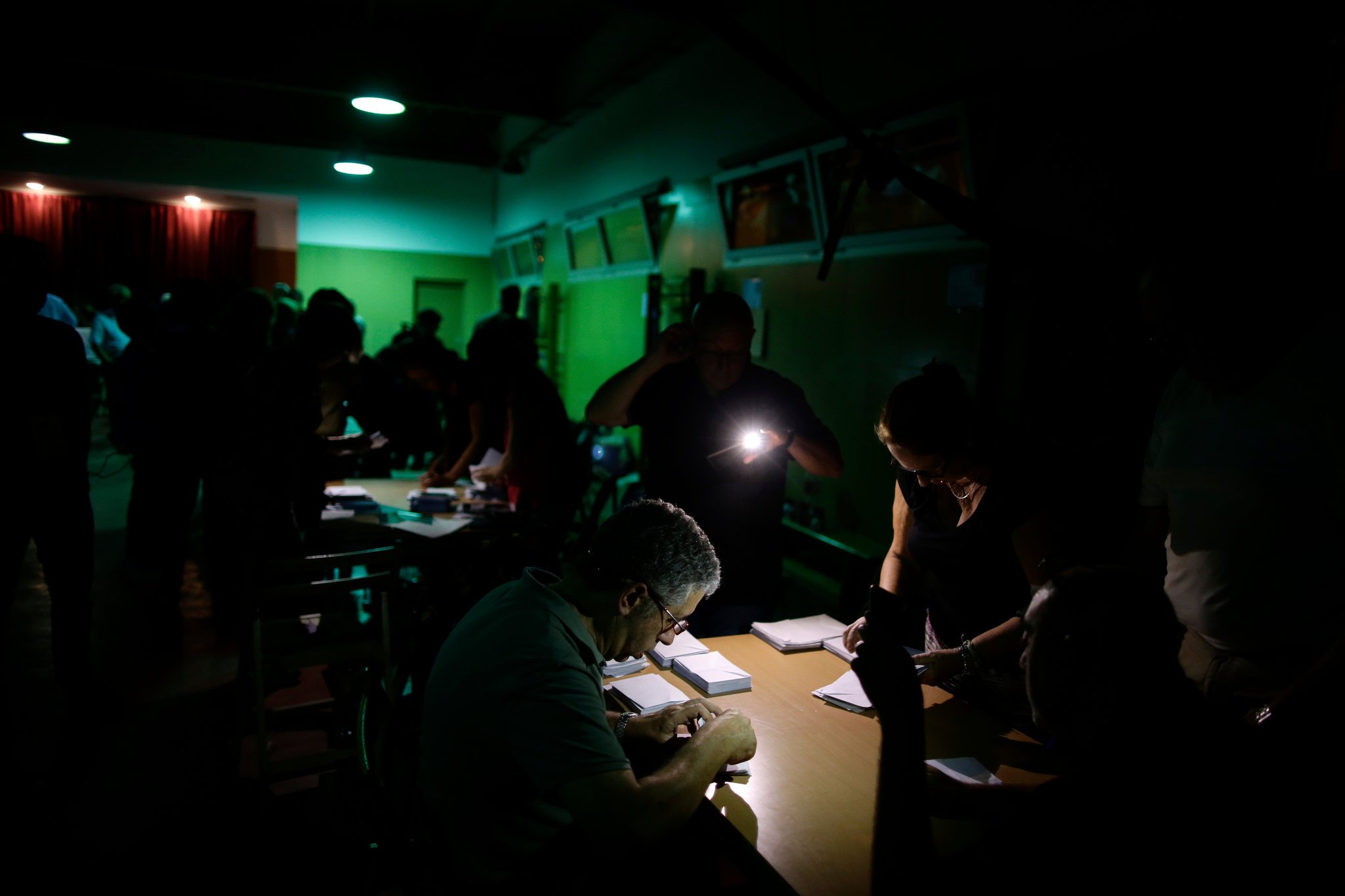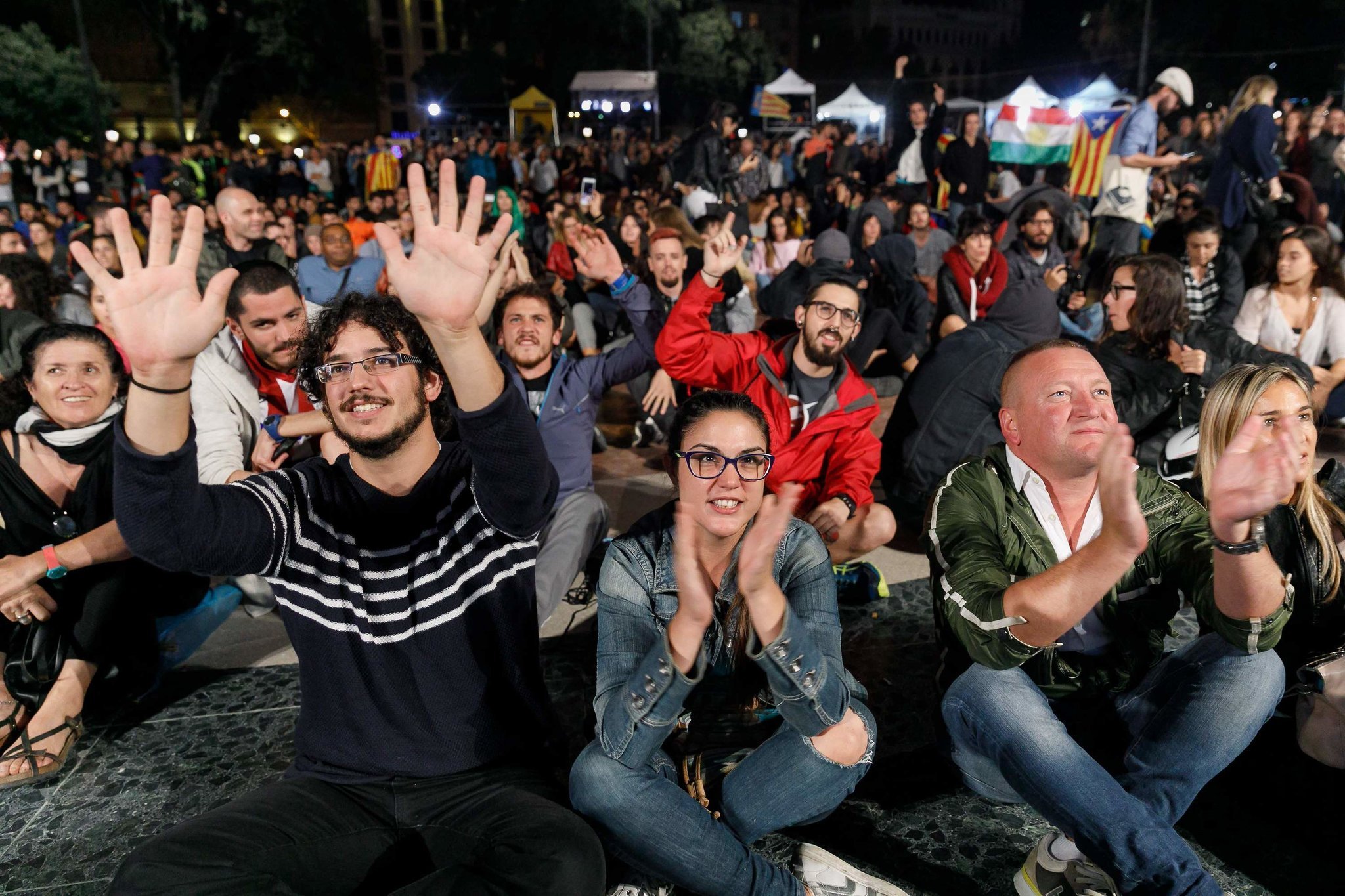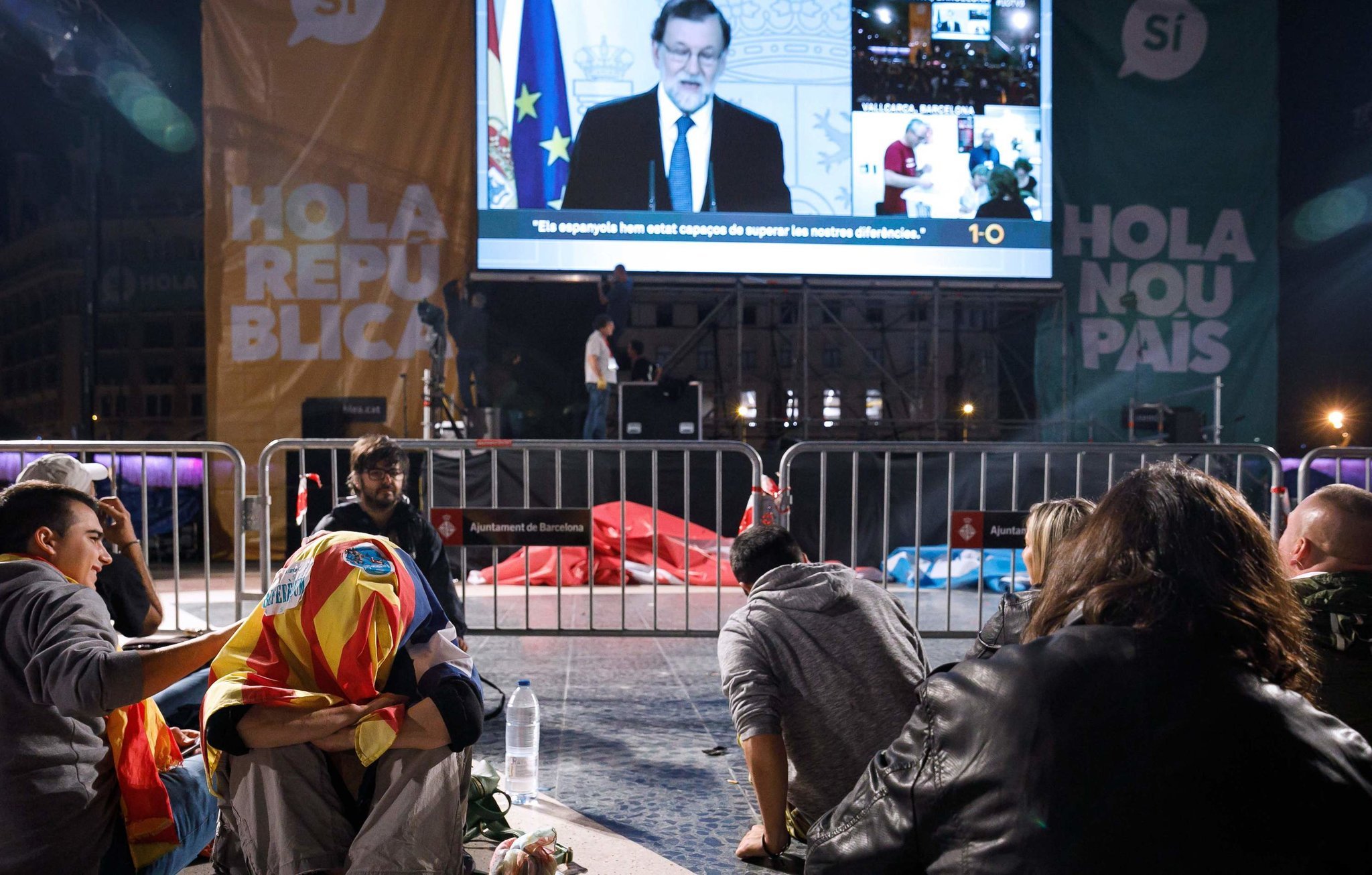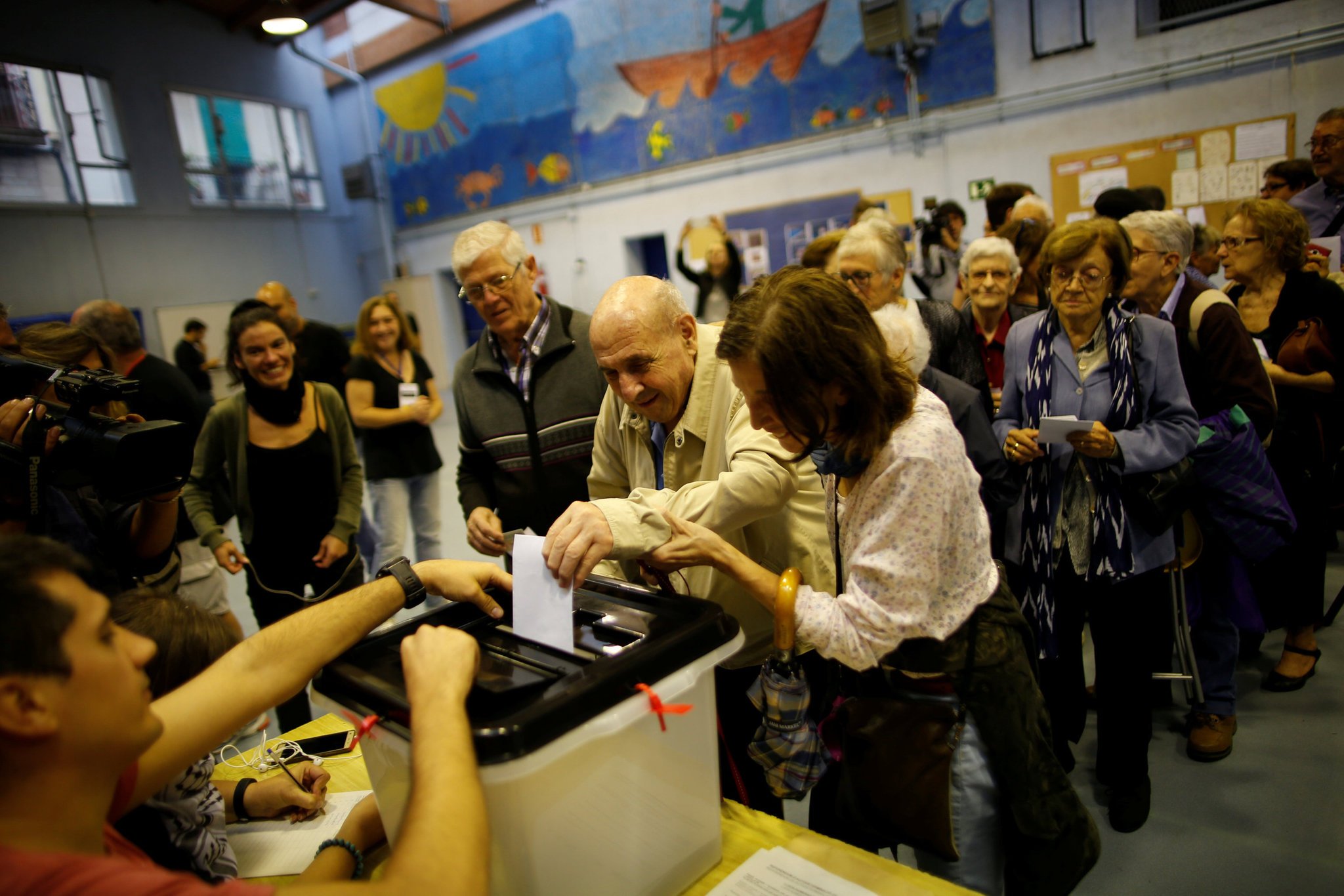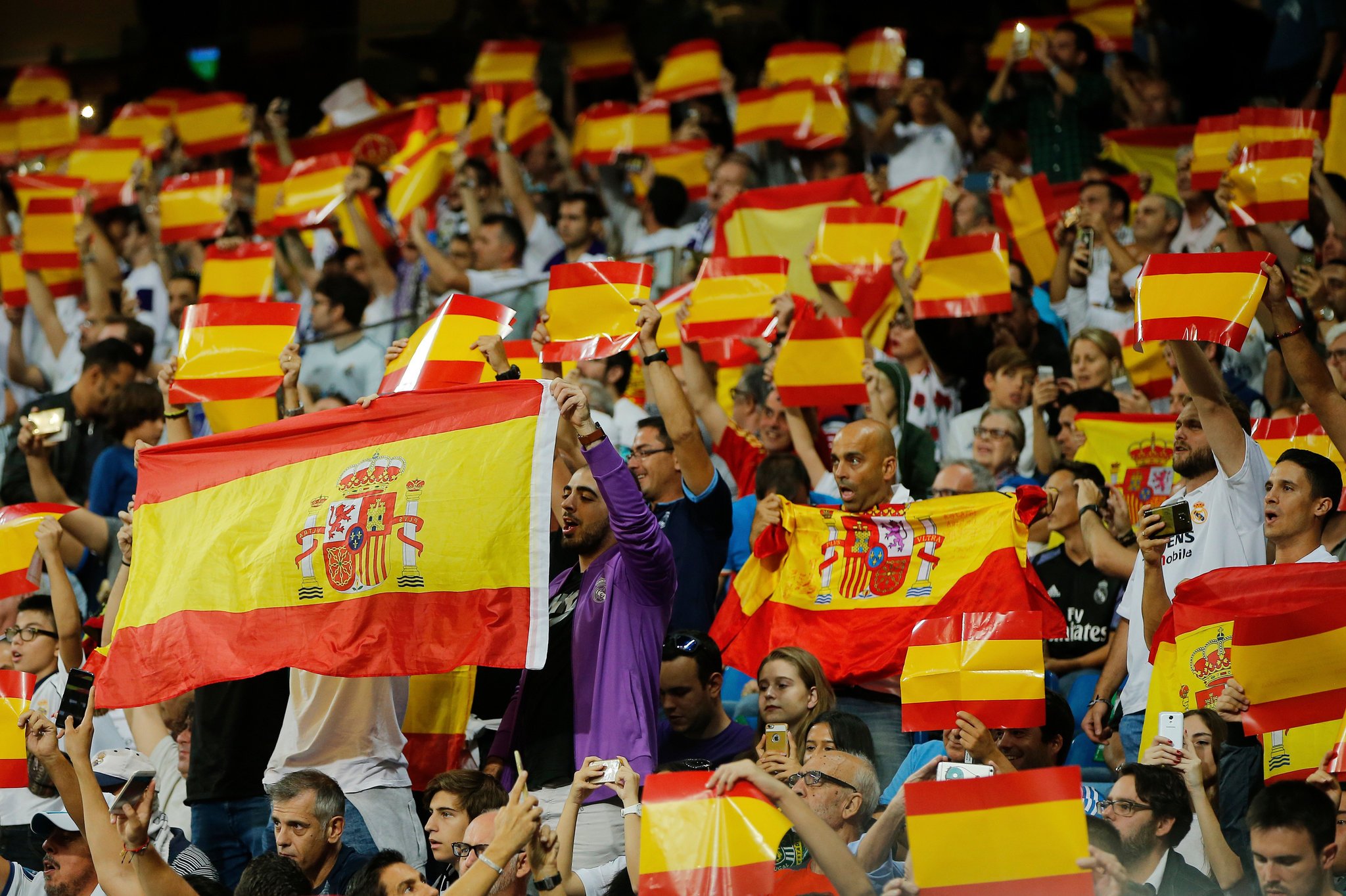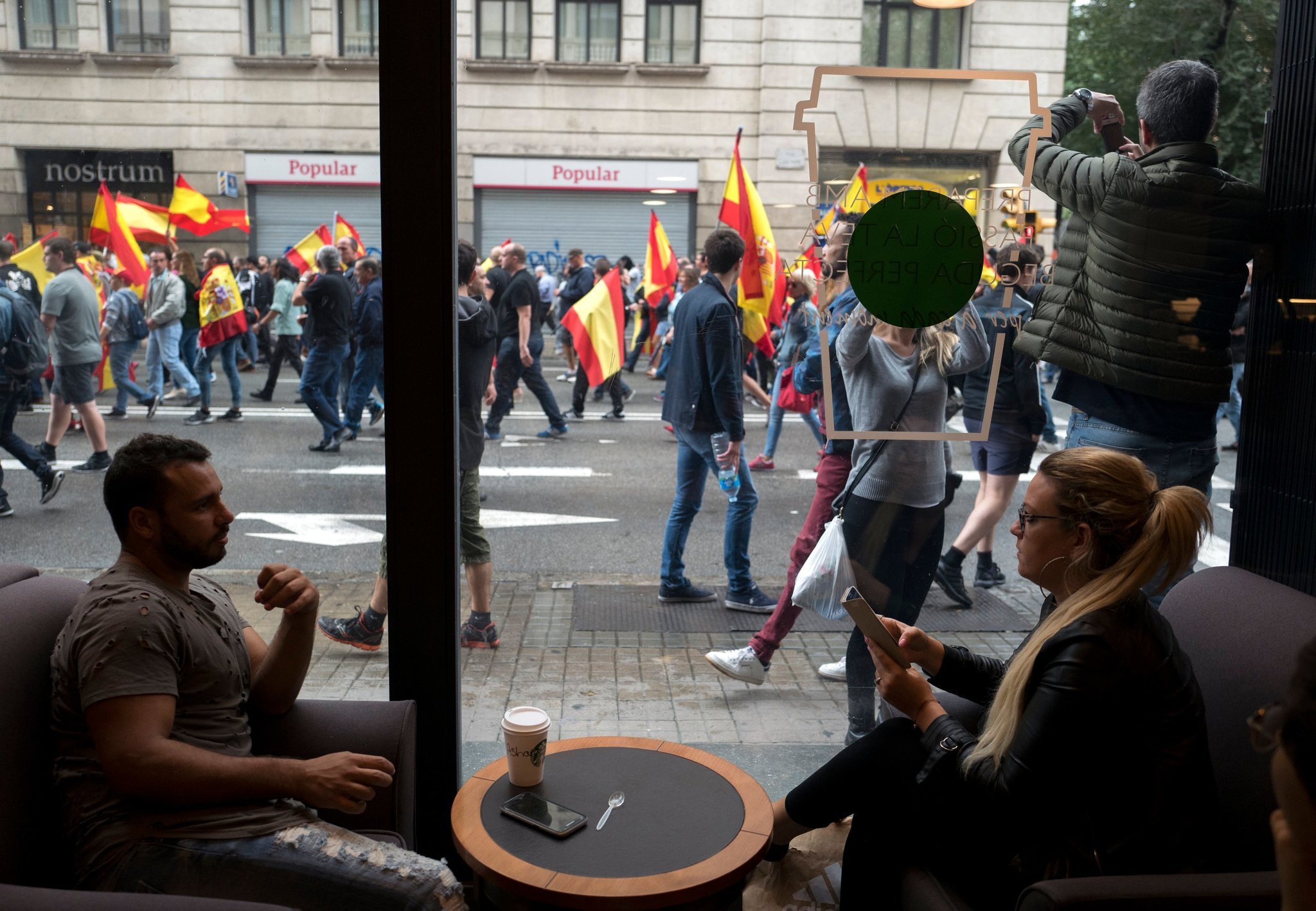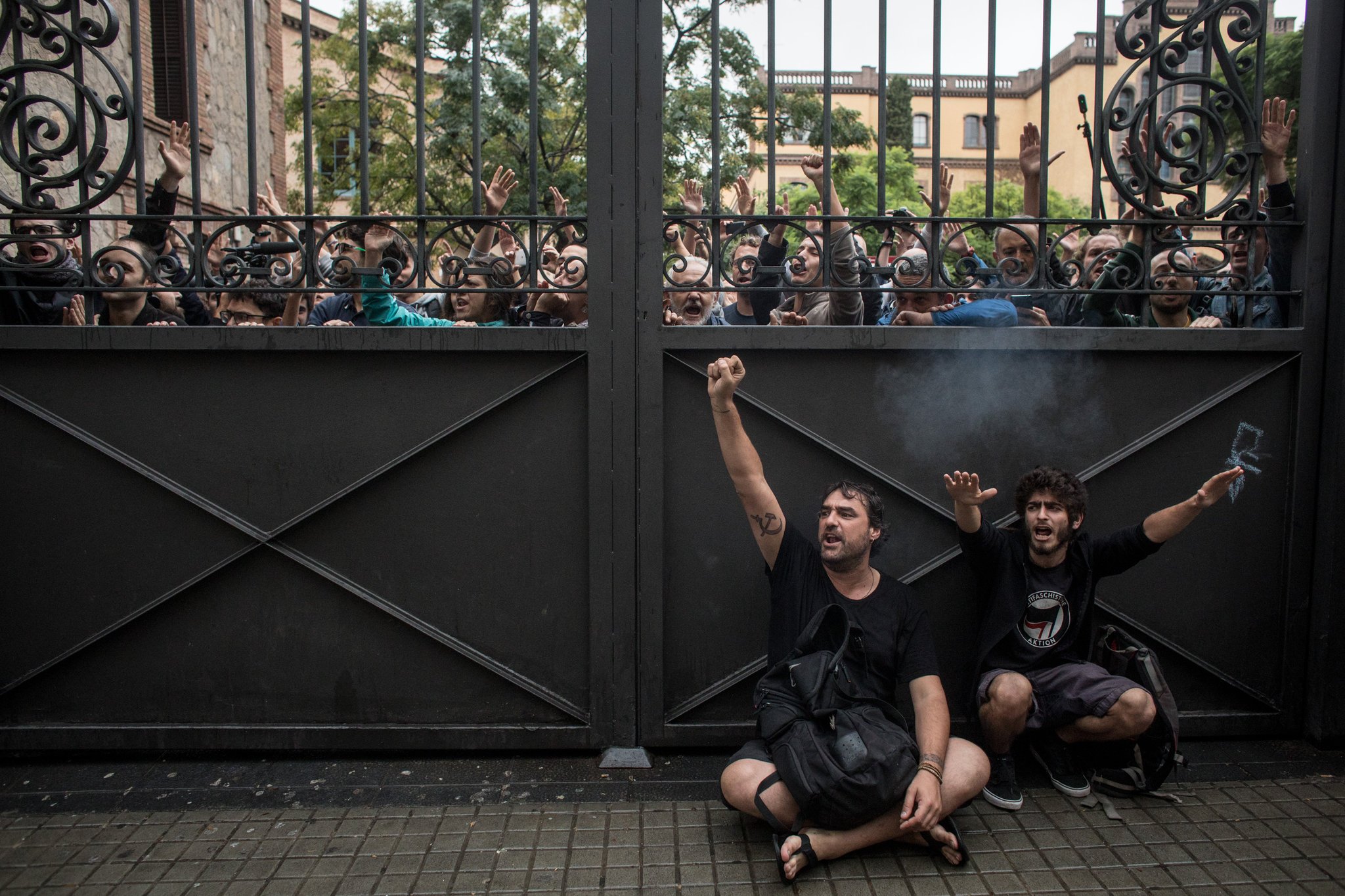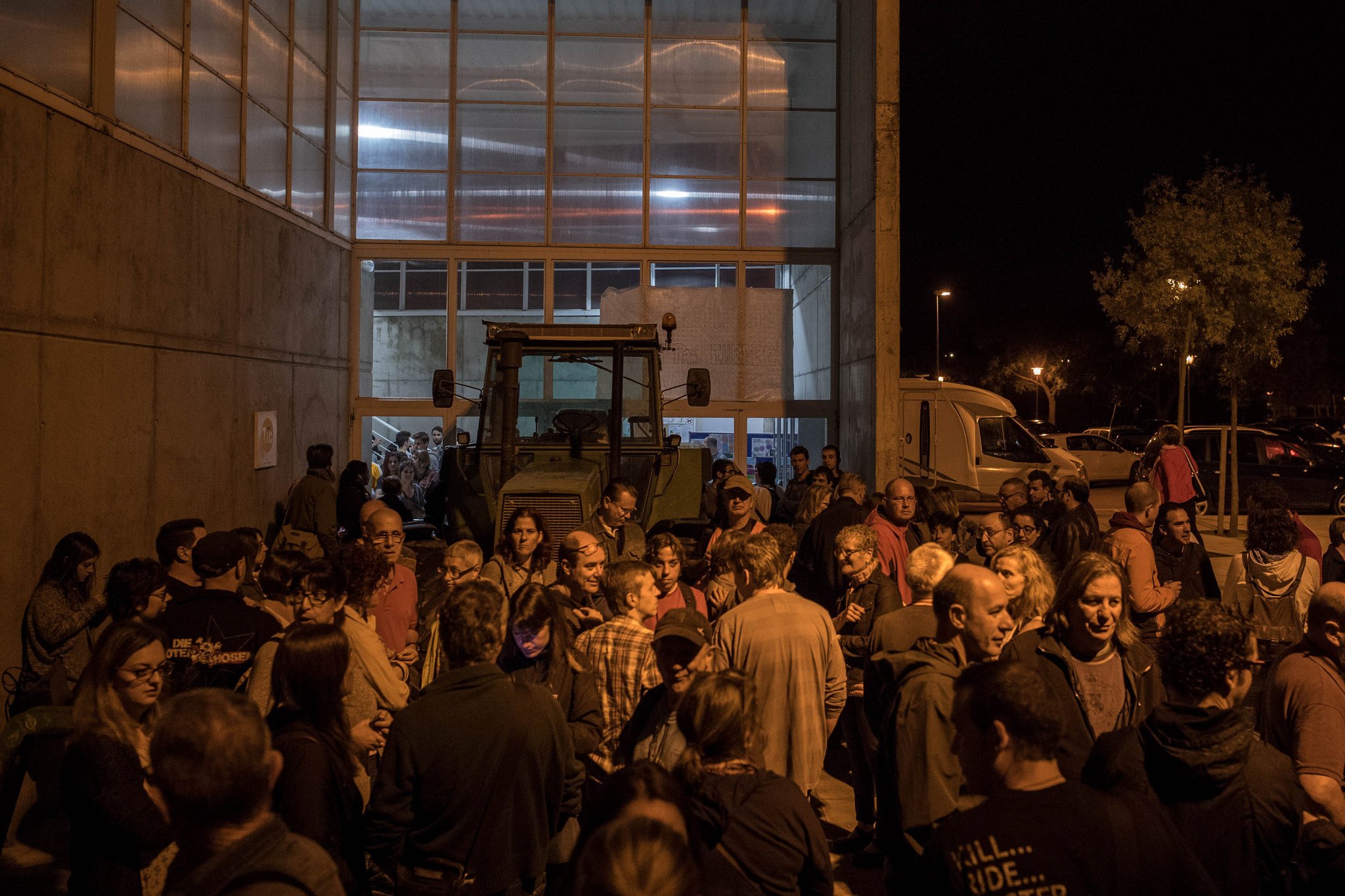BARCELONA, Spain — Catalonia’s defiant attempt to stage an independence referendum descended into chaos on Sunday, with hundreds injured in clashes with police in one of the gravest tests of Spain’s democracy since the end of the Franco dictatorship in the 1970s.
National police officers in riot gear, sent by the central government in Madrid from other parts of Spain, used rubber bullets and truncheons in some places as they fanned out across Catalonia, the restive northeastern region, to shut down polling stations and seize ballot boxes.
The clashes quickly spoiled what had been a festive, if expectant, atmosphere among voters, many of whom had camped inside polling stations and stayed on into late Sunday night, fearful that officers might seize ballot boxes.
By the day’s end, both sides were claiming victory. Voting went ahead in many towns and cities, with men and women, young and old, singing and chanting as they lined up for hours to cast ballots. Just after midnight, the Catalan government said that the referendum had been approved by 90 percent of some 2.3 million voters. Those figures could not be independently confirmed.
The Spanish government declared that the referendum had been disrupted.
More than 750 people were injured in the crackdown, Catalan officials said, while dozens of Spanish police officers were hurt, according to Spain’s interior ministry.
The day’s events left nothing clear except that the clashes over the status of the region — Spain’s economic powerhouse, where yearnings for a separate nation have ebbed and flowed for generations — had left supporters on both sides more hardened and polarized than before.
The Madrid government, with the backing of Spanish courts, had declared the referendum unconstitutional and ordered the vote suspended. But that did not stop Catalans from gathering before sunrise on Sunday, massing on rain-slicked streets across the region.
“Spain has shown us today its ugliest and darkest face, that which we really thought had disappeared 40 years ago,” said Mario Pulpillo, 54. “You simply can’t use violence against people who just want to vote.”
Despite the police threat, Mr. Pulpillo, who uses a wheelchair, said he went to vote “to make sure this was our feast of democracy, not our humiliation at the hands of a Spanish state that believes in repression.”
Voters like him made the turnout an extraordinary show of determination in the face of a steady drumbeat of threats from Madrid.
Prime Minister Mariano Rajoy, at a news conference Sunday evening, characterized the police actions as a proper and measured response to the acts of secessionists. “We did what we had to do,” he said.
Proponents of the referendum immediately pointed to the heavy use of police force as a blight not only on Mr. Rajoy’s conservative government, but also on Spain’s still relatively young democracy.
“The image of the Spanish state has reached levels of shame that will stay with them forever,” the leader of Catalonia, Carles Puigdemont, told a crowd in the town of Sant Julià de Ramis, the scene of clashes.
“Today, the Spanish state has lost a lot more than it had already lost, and Catalan citizens have won a lot more than they had won until now,” he said.
He and other Catalan authorities maintained that balloting had proceeded in most of the polling stations and seemed determined to use the vote as further evidence of the legitimacy of their claim for a separate nation.
The Catalan vote has been watched with rising trepidation — and no sign of support — by a European Union wary of stoking forces of fragmentation already tugging at the bloc and many member states, where populist and nationalist parties have surged in recent elections.
Nationalism in Spain, a country with a long and painful 20th century history that included civil war and fascism, has been all but dormant since the coming of democracy after the death of the dictator Gen. Francisco Franco in 1975. There are already signs that Catalonia’s threat to fracture the country is changing that.
Because of the tensions Sunday, F.C. Barcelona, the soccer club, played a match behind closed doors in its Camp Nou stadium, where the opposing Spanish team came with special uniforms emblazoned with the Spanish flag — something unusual here.
Yet none of the tensions or lack of support — Scotland and Venezuela were among the few backers of the referendum — has dimmed aspirations for independence in Catalonia, a prosperous region with a distinct language, history and culture.
Those separatist passions rose in recent years as Catalans complained that Madrid was unfairly siphoning off their wealth and denying them the right to choose their own political destiny.
Spanish authorities accuse the separatist government of irresponsibly encouraging voters to violate Spanish law.
“If there is something to conclude from today, it is the strength of Spain’s democratic state,” Mr. Rajoy said on Sunday. “We have acted with the law and only with the law and we have shown that our democratic state has resources to defend itself against such a serious attack.”
Soraya Sáenz de Santamaría, Spain’s deputy prime minister, praised the Spanish police for blocking a vote that “couldn’t be celebrated and wasn’t celebrated.”
She told a news conference that the Catalan government had acted “with absolute irresponsibility, which had to be overcome by the professionalism of the security forces.”
After the extent of the crackdown became apparent, Ada Colau, the left-wing mayor of Barcelona, called on Mr. Rajoy to resign over his “cowardly” and unjustified police intervention.
“Today, we’re not talking about independence or not, but about a breakup between Mariano Rajoy and his government with Catalonia,” she told reporters.
Overnight, Catalans had used tractors to block police access to some rural municipalities so that the vote could go on. In other places, residents removed the doors of polling stations to ensure that the police could not bolt them on Sunday.
As Sunday approached, the Madrid government tried everything it could to thwart the referendum: disabling the internet, confiscating ballots, detaining some officials and threatening scores more with prosecution.
The vote took place anyway in an atmosphere of cat and mouse and in improvised conditions, with a disputed census used as the voting list.
Catalan officials instead relied on privately printed ballots, and changed the voting rules an hour before polls were scheduled to open, to allow voters to cast a ballot at any poll station, without using an envelope and whether registered there or not.
Enric Millo, the Spanish government’s representative in Catalonia, said the last-minute change turned what was already an illegal referendum into “a joke.”
Mr. Millo deplored the fact the national police were forced to take over from Catalan police officers who failed to stop the voting. “We’re being forced to do what we didn’t want to do,” he said.
Some videos posted on social media even showed arguments and some tussling between Spanish national police and the Catalan police.
The Catalan police also intervened in Barcelona’s main downtown square to prevent clashes between separatists and a small group of far-right partisans of Spain.
A few outsiders had traveled to Catalonia from other countries to act as observers, saying they wanted to make sure that the police did not use force against voters.
Dimitrij Rupel, a former foreign minister of Slovenia, led a delegation of 35 foreign officials invited by the Catalan government. After watching the police intervene, he said that the “police have nothing to do with the democratic process — they shouldn’t be here.”
Recent opinion polls suggest that slightly less than half of Catalonia’s 7.5 million people support separation from Spain, but separatist parties won a majority in the region’s Parliament in 2015 and their influence has grown.
Many say Catalonia would face a perilous and uncertain future outside Spain, the market for most of the region’s goods, and would not be assured of being readmitted to the European Union.
Others complained that the thrust for independence had deepened divisions within the region, whose vibrant economy has attracted families from inside and outside Spain.
Olga Noheda, a doctor in Centelles, said one of her patients, an older man, began crying in her examination room, and explained that his granddaughter had begun expressing dislike for Spaniards.
“He was very sad, because he didn’t understand where it all came from,” she said. “He migrated to Catalonia many years ago, from Seville, and he was wondering if his granddaughter was aware that he was a Spaniard.”
In Barcelona’s Placa de Catalunya late Sunday night, voters chanted and celebrated the referendum, even if it remained very unclear how the separatist leaders hope to enforce its outcome.
“We’ve shown our way of making politics and changing things is very different to that of Spain,” said Marti Feliu, 21, a history student at Barcelona University. “It’s our opportunity to create a different kind of country, even if we don’t yet know exactly how and when.”
Originally published on The New York Times
The Spanish police blocked the entrance of a Barcelona school that was to be used as a polling station in the Catalan independence referendum on Sunday. CreditEmilio Morenatti/Associated Press
Counting votes during a power outage at a school assigned to be polling station by the Catalan government in Barcelona. CreditManu Fernandez/Associated Press
Awaiting the referendum results in Barcelona. CreditCesar Manso/Agence France-Presse — Getty Images
People gathering in Barcelona to wait for referendum results on Sunday evening watched a speech by Prime Minister Mariano Rajoy. CreditCesar Manso/Agence France-Presse — Getty Images
Some Catalans managed to cast ballots at a school in Barcelona on Sunday. CreditJon Nazca/Reuters
Soccer fans made their sentiments known Sunday as they waved the Spanish flag at a soccer game in Madrid. CreditPaul White/Associated Press
Demonstrators protesting against the Catalonia referendum passed a cafe in Barcelona on Sunday.CreditJim Hollander/European Pressphoto Agency
Pro-referendum supporters blocked a gate to a polling station in Barcelona as members of the Spanish police arrived to control the area. CreditChris Mcgrath/Getty Images
A tractor was used to block police access to a polling station in Sant Julià de Ramis.CreditDavid Ramos/Getty Images
3 WAYS TO SHOW YOUR SUPPORT
- Log in to post comments

